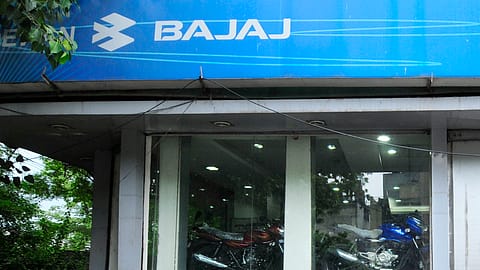Bajaj Auto shares under stress post Q4; what should investors do?
Bajaj Auto shares opened higher at ₹4,368.95, but soon slipped as much as 1.4% to ₹4,282.80 on the BSE.

Bajaj Auto shares dropped over 1% in early trade today after the auto major released its earnings report for the fourth quarter ended March 31, 2023, post market hours on Tuesday. The fall in shares of Bajaj Auto was in sync with the broader market, with the BSE Sensex tumbling 157 points, or 0.26% to 59,973 levels in the first hour of trade so far.
Early today, Bajaj Auto shares opened higher at ₹4,368.95 against the previous closing price of ₹4,343.10 on the BSE but soon slipped into negative terrain. The auto heavyweight slipped as much as 1.4% to ₹4,282.80 in the early trade, while the market capitalisation dipped to ₹1.23 lakh crore. On the volume front, 0.2 lakh shares changed hands over the counter on the BSE compared with two-week average volume of 0.12 lakh scrips.
The share price of Bajaj Auto touched its 52-week high of ₹4,375 in intraday trade in the previous session amid earnings optimism. It hit a 52-week low of 3,461.30 on May 6, 2022. The stock has underperformed the S&P BSE auto index in the last one year, but outperformed the BSE benchmark Sensex. Bajaj Auto shares have risen 18% in the last 12 months as compared to a 20% rally in the BSE auto index and over 6% growth in the Sensex.
In the last six months, Bajaj Auto shares climbed 20%, while it added 17% in a three-month period, and 14% in a month. In the calendar year 2023, the counter surged 20% as compared to a 2.75% rise in the auto index, while BSE Sensex fell 1.2% during the same period.
The two-wheelers and commercial vehicles maker has reported 2% year-on-year decline in net profit to ₹1,433 crore for the quarter ended March as exports worsened amid the deteriorating macroeconomic conditions across overseas markets. However, revenue from operations rose 12% to ₹8,905 crore in Q4FY23 as compared with ₹7,975 crore in the corresponding period last year, led by the sustained momentum of the domestic business that delivered strong volume-led revenue growth of over 50% YoY. Operating profit or earnings before interest, taxes, depreciation, and amortization (EBITDA) jumped 26% to ₹1,718 crore in Q4 FY23, while EBITDA margin stood at 19.3% compared with 19.1% last year.
The board of Bajaj Auto also announced a final dividend of ₹140 per share, totalling to about ₹3,961 crore. This, along with the share buyback that was concluded earlier in the year will add up to almost ₹7,055 crore of cash being paid to shareholders.
Analysts view on Bajaj Auto shares post Q4:
Recommended Stories
JM Financial maintained “BUY” rating on Bajaj Auto stock with a target price of ₹4,600, citing the successful track record of product intervention by the company in the last few years. Going ahead, delay in new product launches and continued weakness in export markets remained key risks, it said.
The agency in its report said that export business continued to witness macro headwinds during the March quarter. Overall, the management expects export volumes to gradually recover once U.S. dollar availability improves.
“Volumes fell double-digit in key international markets owing to limited availability of U.S. dollar and demonetisation in its key export geography - Nigeria. While the dealer inventory has normalised in most key markets, the company is unable to dispatch stock owing to the limited availability of forex. The company indicated that export volumes have troughed as the retail demand has started to gradually recover since Mar’23.”
ICICI Securities have retained “ADD” on the stock with a revised target price of ₹4,563 from ₹4,051 earlier and also increased its FY24/25 EBITDA estimates by around 4%. Rise in competitive intensity in the Pulsar segment, further increase in input costs, reversal of FX benefits, and decline in exports on a high base of FY22 were key downside risks for the company.
(INR CR)
Bajaj Auto plans to launch its first e-3 wheeler as soon as the company receives FAME certification. The testing is still going on and the company would do a select city limited launch in mid-FY24 and subsequently look to expand in other cities based on the initial launch feedback, ICICI Securities said in its report.
LKP Securities has maintained “BUY” rating on the stock with a target price of ₹4,224, citing strong balance sheet, robust return ratios, hefty dividend yield of 3.8% in FY22, and zero financial leverage. The agency expects a strong traction coming from new launches which would drive overall demand. On the exports front, markets like ASEAN markets should be able to somewhat offset weakness in Africa and Latam. With higher capex associated with EVs, new 2W platforms and maintenance capex (₹750 crore) shall further expand their market and ambit of portfolio, it said, adding that EV 3W launch should further aid the business.
Prabhudas Lilladher has maintained ‘HOLD’ with a target price of ₹4,130 from ₹4,020 estimated earlier. The brokerage has marginally increased its FY24/25 EPS estimates by 1-3% to factor in higher ASPs from increase in EV volumes, partially offset by cut in volumes for exports. Margins expanded helped by significant inventorisation benefit, higher spare mix and better vehicle mix, offset by lower operating leverage. Concerns on the export volumes continue (around 50% of sales) with the company delaying the recovery timelines led by uncertainty on unavailability of USD and lower affordability. Also, lack of market share gains in the domestic motorcycles market over the last few years, and increase in competition could lead to further pricing actions. However, the agency expects Bajaj Auto’s domestic premium segment volumes to grow (similar to the industry) helped by premiumisation trends and fast ramp-up of EVs could make us turn constructive on the stock.